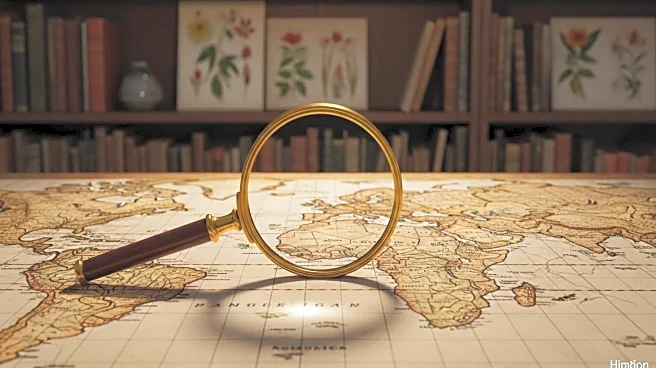What's Happening?
Ian McEwan's latest novel, 'What We Can Know,' is set in a future UK where rising sea levels have submerged much of the country. The narrative follows Tom Metcalfe, an academic in 2119, as he navigates a world transformed by climate change. The novel intertwines two main threads: the future world affected by climate change and a historical investigation into a dinner party from 2014, where a poem allegedly addressing climate change was read. This poem, said to be suppressed by big oil, becomes the focal point of Tom's research, as he seeks to understand its significance and the lives of those who attended the dinner.
Why It's Important?
The novel highlights the potential consequences of climate change, emphasizing the drastic changes that could occur if current trends continue. By weaving a literary mystery into the narrative, McEwan prompts readers to consider the role of art and literature in addressing environmental issues. The story also explores themes of historical accuracy and personal obsession, offering a reflection on how past actions and cultural artifacts can influence future perceptions and policies. This narrative serves as a cautionary tale, urging society to take climate change seriously and consider its long-term impacts.
What's Next?
As the novel gains attention, it may spark discussions on climate change and the role of literature in environmental advocacy. Readers and critics might explore the implications of McEwan's fictional world, comparing it to current climate predictions. The book could inspire further literary works that address environmental issues, encouraging authors to use storytelling as a tool for raising awareness. Additionally, the novel's exploration of historical events may lead to debates on the accuracy and interpretation of past actions in shaping future narratives.
Beyond the Headlines
The novel delves into ethical questions surrounding the suppression of art and information, particularly in the context of climate change. It raises concerns about corporate influence on environmental discourse and the potential for censorship. The story also examines personal relationships and motivations, offering insights into how individual actions can have broader societal impacts. By blending fiction with real-world issues, McEwan challenges readers to consider the complexities of human behavior and the interconnectedness of cultural, environmental, and historical factors.










